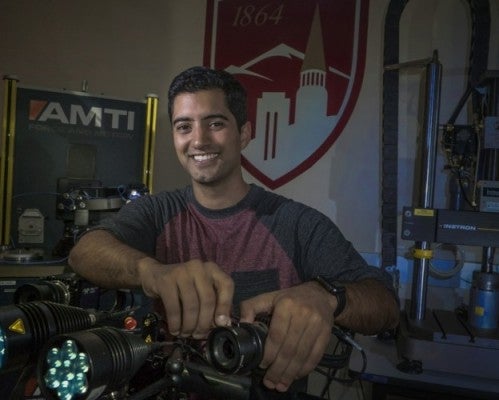Building a Better Knee
Students explore biomedical and health interests with professional science master’s degree
“I’ve always been fascinated with the mechanics of the body — how your muscles and bones move together to allow you to be active,” says Yashar Behnam, a student in DU’s professional science master’s (PSM) degree program in biomedicine.
Behnam, who holds an undergraduate degree in physiology and plans to pursue a career in orthopedics, has found himself looking at the human musculoskeletal system in an entirely new way thanks to the program. Working in a lab with engineering professor Chadd Clary, he’s studying joint replacements from the perspective of a mechanical engineer.
“It’s opened up a different area of orthopedics that I would never have been exposed to otherwise,” Behnam says. “I’ve been thrown into a lab of engineers, which has made me transition from the biological side to the physical side.”
The PSM degree in biomedicine, which is part of the Department of Biological Sciences, differs from a traditional research-based master’s degree. Students acquire both scientific knowledge and professional skills, preparing them for careers in the biomedical and health sciences. The interdisciplinary nature of the program includes courses in the natural sciences, social sciences, engineering and more.
Behnam is looking specifically at knee-joint replacement components. Currently, he uses synthetic bones to test and assess different designs; as the research progresses, he’ll transition to cadaver bones. The goal is to provide medical-device manufacturers with information that will help them create designs that minimize component failure and patient pain.
Clary sees this work as essential for manufacturers looking to build better replacements. “Enabling the next generation of total joint replacement requires a great deal of basic engineering research to optimize the designs,” he says. “The scientific contributions from graduate students such as Yashar will directly impact the thousands of patients who receive this implant.”
As Behnam prepares to apply for medical school, the PSM degree has proved to be a valuable bridge between his undergraduate experience and his aspirations.
“What is so attractive about this program for me is that it allows you to tailor your studies to your interests,” he says. “And if you’re unsure of your career path, it’s a great opportunity to expand your knowledge.”
The program launched in 2014 and has since graduated 10 students.
“It’s been very exciting to watch our growing group of graduates pursue diverse interests all related to healthcare,” says Nancy Lorenzon, the faculty member who oversees the biomedicine program for the Department of Biological Sciences. “The unique advantage of this program is that students can customize the curriculum and capstone project to meet their future career endeavors.”
A core mission of DU’s Division of Natural Sciences and Mathematics is to offer students unprecedented access to research opportunities. By working alongside distinguished faculty mentors in state-of-the-art facilities, undergraduate and graduate students are able to apply their knowledge to research that changes lives and challenges ideas.








